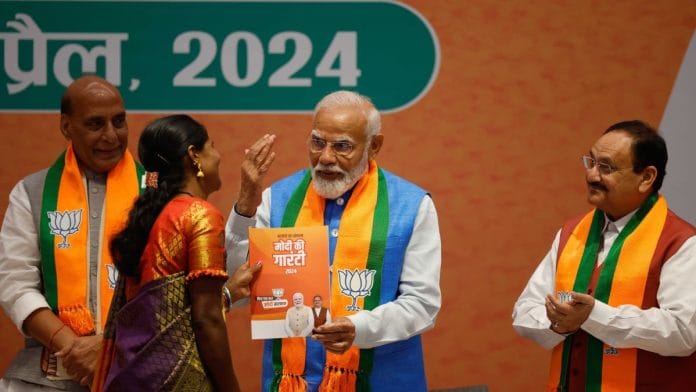The Bharatiya Janata Party’s manifesto is finally out; only days before the first phase of the 2024 Lok Sabha elections. If the decibels have been high and even outlandish in proclaiming a brutal two-thirds victory of 400 plus or char sau paar for the party, then its latest manifesto is no match.
An easy-on-the-eyes 76-page document, the manifesto’s main thrust remains Prime Minister Narendra Modi. With nearly 50 images devoted to him, Modi looms large in this otherwise oddly dull document. From the global to the granular, each promise within this manifesto comes with the PM’s personal guarantee. Yet, for all the glitz of Modi in various forms with world leaders and ordinary citizens, the manifesto has none of the bluster that is currently being heard from the ramparts of BJP rallies.
Manifestos, by their nature, are declaratory. Focused on the future, they are the closest a party comes to presenting a political vision as a promise. Even if that promise is deferred or, as often happens, largely unmet and broken. Yet manifestos provide the clearest benchmark between vision and reality, in which the messy work of politics often takes shape. On that benchmark alone, the BJP seems in the thick of some messy ideological ground.
Hindutva-Lite?
For the core BJP supporter, for whom India is not just Bharat but a Hindu-first polity in the making, the document will likely disappoint. Even as the road to courts has been taken, there is no mention of expanding the temple movement to Kashi or Mathura. Instead, in showcasing the recently consecrated Ram temple in Ayodhya, the BJP seeks to go global with the Ramayana. If the cause of Ram ensured the ascendancy of the BJP as a national electoral force, then the document points to taking the epic and its deity to further shores in a bid to revitalise the older geography of Greater India. In short, the very cause that transformed national politics through sound, fury and much worse, will now, perhaps, appear in a softer avatar to project New India’s global ambitions.
Also missing from the manifesto are any claims about a delimitation exercise that could make northern India the determining and dominant force of Indian polity. Nor, for that matter, does the manifesto mention the creation of a National Register of Citizens (NRC) that is to deform the relationship between the citizen and the state. In fact, the imagery is telling. Not a single picture in the manifesto displays the new Parliament building that has created space for an enlarged set of parliamentary berths. As one of the key architectural legacies of the last decade, its omission is striking.
So, have the long-reviled liberals of India who have consistently warned about the dangers of the legal and structural changes to come, been vindicated? What is clear is that exhaustion and even fatigue have set in with the relentless cultural and political remaking of India. The Prime Minister may heckle on the propriety of vegetarianism and whatnot, but what is clear, at least from the manifesto, is that what makes for a fiery speech is unlikely to make for a promising policy for the future.
More to the point, the manifesto is partly an exercise in managing expectations and calibrating to the latest surveys that decidedly point to the economy as the coming touchstone of political fortunes.
Also read:
Guarantees, galore
In the sprawling litany of welfare schemes or guarantees promised to women and farmers – the young and the old alike – the BJP manifesto could be mistaken for a progressive utopia, if of a bygone age. Even though the BJP has been heralded as a party of economic reform since its inception as the Bharatiya Jana Sangh, its manifesto suffers from a poverty of economic vision, and is the single biggest missed opportunity.
For all the achievements of India emerging as the fifth largest economy headed to the top-three table of world economies, the manifesto offers little to no real roadmap in confronting and shaping the global economy. While the buzz of infrastructure and connectivity dots the pages with Singapore-like images of trains, roads, planes and even spacecraft thrown in for good measure, the manifesto offers no grand vision.
Looking at the world economy today – Singularity in Silicon Valley, a shift in global supply and value chains, mortgages, pensions, sovereign funds and FDI – global capitalism looks worn out and in search of a big new idea especially in tackling both investment and inequality. Instead of seizing this moment, the economic ideas of the manifesto seem to be content in only repeating the infra-tech mantras of the last decade. In short, it only offers more of the same.
If anything, in attending to every big and small sphere of economic activity, from turning India into a textile superpower to my personal favourite ‘Wed in India’ that will showcase wedding destinations, the manifesto is but a blur.
Finally, the manifesto being littered with welfare schemes – most glaringly of food security – is an admission of economic strife and arguably even defeat. For all the forward-looking gigantic economic scale, if India still must guarantee food rations to millions of its citizens, then much like the besieged liberals, the even more reviled povertarians may, after all, have a case. If anything, the ruling party’s manifesto is a reality check on the very passions that it unleashed and that have gripped India now for a decade.
The Indian Opposition may have a long way to go to occupy the national government. The BJP’s manifesto is the clearest evidence that India’s Opposition has set the terms of the 2024 electoral contest.
Shruti Kapila is Professor of History and Politics at the University of Cambridge. She tweets @shrutikapila. Views are personal.
(Edited by Zoya Bhatti)







Is it possible that it disappoints Woke Ayatollahs more than anyone else?